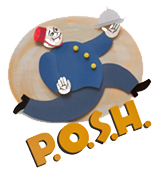Learn More about Limoges Porcelain
Limoges porcelain designates hard-paste porcelain produced near the city of Limoges, France. This exquisite porcelain has been produced in Limoges since the late 18th century.
The manufacturing of hard-paste porcelain at Limoges was first established in 1771 following the discovery of local supplies of kaolin and feldspar rock. These materials were used to produce hard-paste porcelain similar to Chinese porcelain which was very popular during that time.
The beautiful porcelain produced in the factories at Limoges caught the eye of the French Count of Artois. The Count was the brother of the French King Louis XVI, who later purchased those factories in 1784, making them royal manufacturers to the King.
After the French Revolution a number of private factories were established at Limoges, including the venerable Bernardaud and Haviland & Co. factories. To this day, Limoges continues to maintain the position it established in the 19th century as the premier manufacturing city of porcelain in France.
But what is Hard-Paste Porcelain?
Hard-paste porcelain is porcelain that is made from a compound of feldspathic rock and kaolin fired at very high temperatures. It was first made in China around the 9th century. The secret of hard-paste porcelain's manufacture was not known in Europe until 1707, when Johann Friedrich Böttger of Meissen, Germany discovered the formula. As the recipe was kept a trade secret by Böttger for his company, experiments continued elsewhere throughout Europe until 1712, when a French priest living and working in China discovered the Chinese technique and described the process in letters back to France.
Hard-paste porcelain is differentiated from soft-paste porcelain mainly by the firing temperature, with the former being higher, to around 2,550°F, and the latter to around 2,200°F. Depending on the raw materials and firing methods used, hard-paste porcelain can also resemble stoneware or earthenware. Hard-paste porcelain can also be utilized to make porcelain bisque, a type of porcelain. It is a translucent, bright, white ceramic. With it being almost impermeable to water it is unnecessary to glaze porcelain bisque.
